- Affiliate Program

- UNITED STATES
- 台灣 (TAIWAN)
- TÜRKIYE (TURKEY)
- Academic Editing Services
- - Research Paper
- - Journal Manuscript
- - Dissertation
- - College & University Assignments
- Admissions Editing Services
- - Application Essay
- - Personal Statement
- - Recommendation Letter
- - Cover Letter
- - CV/Resume
- Business Editing Services
- - Business Documents
- - Report & Brochure
- - Website & Blog
- Writer Editing Services
- - Script & Screenplay
- Our Editors
- Client Reviews
- Editing & Proofreading Prices
- Wordvice Points
- Partner Discount
- Plagiarism Checker
- APA Citation Generator
- MLA Citation Generator
- Chicago Citation Generator
- Vancouver Citation Generator
- - APA Style
- - MLA Style
- - Chicago Style
- - Vancouver Style
- Writing & Editing Guide
- Academic Resources
- Admissions Resources

What Do Colleges Look for in an Essay? Examples & Tips
What is a College Essay?
The college essay is an essential element of the college application process. It presents an opportunity for students to personalize their college application, beyond grades and scores. It can also be one of the more nerve-wracking parts of the application process.
If you are reading this article, you are like applying to college and taking the process seriously. The quality of the college you attend will have a big effect on your entire life, and taking a few hours to make your application the best it can possibly be may be the most lucrative time investment you will ever make.
What do colleges look for in an essay from applicants?
So, what do colleges look for in an essay? The answer is similar to what colleges look for in an applicant. To hit the right notes, you need to consider the perspective and even the mission statement of the college, which of course values intelligence, a good work ethic, and the type of personality that will represent the school.
Therefore, the core aspects that admissions officials at any institution look for in an essay are:
· Intelligence
· Strong communication skills
· Ambition and goals
· Creativity
· Proactivity and self-direction
· Interest in education and self-betterment
These elements are not based on any abstract moral consideration–colleges want students who will make their institution stronger. They will look for evidence of these traits in your personal essay, as grades only reflect a few of these core aspects and abilities.
Beyond these considerations, remember that an admissions officer (an actual human being) will read your essay and respond to it both rationally and emotionally. In many cases, that emotion is boredom. Keep in mind that these officials read hundreds of application essays each admissions season. But if your essay can successfully win them over, then you’ll be getting a letter that begins with a “We are delighted to announce…”
Qualities Colleges Look for to Include in Your Essay
Most achievements that colleges are looking for will be reflected in your college application, and therefore, these have been left off of the list below. The achievements showing your passion and drive, as well as your internal and external motivations, will be the ones to include in your application essay.
Challenging extracurricular activities
Colleges want to see students who stretch themselves beyond the limits of the classroom. The kinds of activities you choose say a lot about your personality and even your morals. Whether or not you stick with your chosen undertakings exhibits your ability to commit to important projects in the long term.
Volunteer and work experience
Any experience you have that shows true commitment, leadership qualities and an interest in community is beneficial to your application. Include the organizations or companies you worked for and what your responsibilities were at each one. If you received any promotions or special recognitions, be sure to mention those as well.
Talents and passions
More colleges are moving away from accepting students who did the most “stuff” to looking for those who focus their energy in specific areas that they’re passionate about. Schools want to see what makes you special and how hard you’re willing to work at the things you care about.
Obstacles or challenges you have overcome
One of the most important aspects of a good college student is their ability to learn from mistakes and overcome challenges in order to achieve success. This is especially true for Common App Essay prompts . In your essay, focus on what exact difficulties or challenges you faced, how you overcame them, and what you learned from this experience. After all, admissions officials are more impressed by a student who came from an adverse situation and still achieved success than they are with a student who had every advantage handed to them and skated by on position and intelligence.
What is a well-written essay?
Admissions officers read a lot of essays, and a well-written one can make a refreshing change. Students should check their essays to make sure they clearly meet these criteria:
- Does the essay provide a direct answer to the essay question?
- Does it have a strong opening paragraph that captures the reader’s interest?
- Does it put forth a comprehensive argument or narrative? Does the student make a point and stick to it?
- Does it have a natural style that’s comfortable for the student and appropriate for the subject matter?
- Did the student use effective word choice, syntax, and structure?
- Does it contain correct grammar, punctuation, and spelling?
- Is it succinct? Did the student pay attention to the recommended length?
How to Write About Positive Qualities in an Application Essay
The rule of thumb here is always “Show–don’t tell.” When writing a college essay, skip generalized information. Instead, provide real, specific examples to support your statements. Your attention to detail will help make you more memorable to an admissions officer who has to read hundreds, if not thousands, of essays.
For example, instead of “I love hiking,” you could say, “After reaching the summit of Mt. Kilimanjaro, I decided my next adventure would be climbing Mt. Everest.” What’s the difference between these two sentences? The first says you like something, while the second one illustrates that you do—but not only that, it also shows your level of commitment and your desire for challenge. Of the two example sentences, which do you think maximizes your use of words and would be more interesting to admissions officers?
Bad example: Claim without proof My teacher once told me that I was the most skilled and intelligent student she’s ever taught, and I believed her. When I set a goal, there’s no stopping me. I’ll work at it until it’s achieved—even if it’s to my own detriment.
Good example: Showing with concrete evidence In sophomore year, I decided to set a goal to raise more money for Relay for Life than any other student involved. I asked my neighbors, family, teachers, and even my paster, who sat through my 20-minute prepared speech about why donating to this campaign would be the best use of his money. I spoke to community groups. I did three straight weekends of door-to-door fundraising. And in the end, my efforts paid off—I succeeded in raising over $500 more than any other student.
Showing initiative and ambition
Initiative and ambition are top qualities that colleges look for in an applicant. Students who exhibit these traits will bring a positive and driven attitude with them to college, where it will help them contribute to the campus and succeed in their academic endeavors.
The college essay should always show how you took some kind of action—it shouldn’t just include things that happened to you as a passive individual. For example, rather than simply writing about how it was emotionally difficult when your older sibling got sick, discuss specific coping strategies you developed during that time or ways that you contributed to helping your sibling and family.
Showing self-reflection and growth
Personal growth is one of the most popular topics to write about since it represents what the admissions essay is all about: helping the college gain better insight into your personality and character. Some schools ask targeted questions — “What was the most challenging event you have ever faced, and how have you grown from it?” — while others leave the topic open: “Describe an event that has had great meaning for you. Explain why and how it has affected you.”
One of the most successful strategies is to use a past event as a lens through which you can assess who you were and the person you became, how you have grown and changed, and your transformation. Most children are curious, but were you the one who asked your teacher what caused the change of seasons of the year and then created a solar system model and explained the concept to your classmates? Though you may think that your topic needs to be bold and unique, this is not necessary to craft an effective essay. Instead, success lies in painting an accurate and vivid picture of yourself — one that will show admissions officers that you have much to offer their school.
Structure your essay with a clear beginning, middle, and end
When you include the basic plot elements of setting, introduction, conflict, and resolution, not only will your essay be more fun to read, it will be easier to write. And when writing is easier, you are usually having more fun and pouring more of yourself into your writing. You will find that this often translates into a more compelling story as well since passion and interest are hallmarks of any good story told to a friend or included on the page of an adventure or romance novel. When structuring your narrative arc, include the lessons you have learned from these experiences: How did you change? What did you learn? What did/do you plan to do differently because of these experiences? Anyone can write about how they won first place in a competition or spent a fantastic vacation in Europe. The important stuff is not in the itinerary, but rather in the diary–what you learned from the experience and how it impacted you.
Essay Introduction #1: Focus on Your Personal Qualities
One approach when beginning your application essay is to start by describing positive character traits you possess and then showing examples of times you demonstrated those traits.
Starting with your qualities A student wants to show that he is determined and tenacious. He thinks about times when he went above and beyond what was necessary to succeed in high school. He thinks of how he became the only student at his school to participate in three or more AP classes while also being involved in multiple sports and extracurricular activities. He also thinks of his volunteer work with his church at a local homeless shelter, where he made friends and connections with shelter guests and high-profile members of the community. These are the qualities around which his essay is focused.
Essay Introduction #2: Focus on a Personal Story
Another way to approach your essay topic is to start with a story and then work show examples that demonstrative your positive qualities.
Starting with a story A student’s sibling has been fighting cancer for the past three years, and he feels that this is an important experience that has shaped who he is today. He considers how the difficulties of this experience have changed him and help distinguish him from other applicants.
From introducing his story at the beginning of his essay, this applicant can tie in the positive qualities he exhibits with the finer details of his personal story:
- He is independent, as he needed to deal with taking care of a loved one in a serious and sustained way that his peers did not need to deal with.
- He is focused, as dealing with regular medical emergencies has not deterred him from achieving good grades and being part of his community.
- He is empathetic, as he understands personally how hard times can impact people.
Whatever essay topic you choose, your essay should provide admissions officers concrete evidence that you are an ideal candidate for their school. Your essay should have a memorable introduction that grabs the reader’s attention and guides the rest of your essay.
Repeat Your Qualities in the Essay Conclusion
Although your essay introduction is crucial in starting your essay off in a clear and impactful direction, how you end your essay is also important as it is the last thing that will remain in the reader’s mind. One surefire way to write a strong essay conclusion is to repeat the important qualities you discussed earlier. Recall details about your personal story or repeat the qualities you introduced at the beginning of the essay. Here is an example of what a good conclusion can capture what colleges are looking for in an essay:
Concluding your essay by repeating your qualities During my high school years, my qualities of leadership, initiative, and hard work have help shape me to become the strong student I am today. As the head of our school’s volunteer group, I showed that even a teenager can make a big impact. As a student achieving high grades in all three of my AP courses, I demonstrated my dedication to education about all. Finally, as a daughter of working-class immigrant parents, I have used my value of hard work to achieve things my parents never thought possible. These values have contributed to making me the conscientious and successful student and person I am now, and they will surely continue to assist and guide me in my academic and professional career.
Interesting Essay Topics to Write About
There are hundreds of resources available online about writing college essays (including How to Write the Common App Essay ). And while you can find dozens of interesting and fruitful essay topics that have worked, here are just a few more that are not too specific and can be molded to fit your unique profile and personal story.
1. A unique extracurricular activity or passion
2. An activity or interest that contrasts heavily with your profile
3. A seemingly insignificant moment that speaks to larger themes within your life
4. Using an everyday experience or object as a metaphor to explore your life and personality
5. An in-the-moment narrative that tells the story of an important moment in your life
Additional Tips for Writing an Essay Colleges Will Love
Choose a strong essay topic.
First, whichever structure you will use, you need to ask yourself what you actually want to accomplish in life (esp. in terms of career) . This gives you your goals. You need to choose a program that helps you reach these goals—otherwise, you should seriously reconsider whether you should even be applying!
If you are using the “Story” structure…
The story is going to be your topic, so make it an engaging tale… but remember you are not here to show that you are the next Shakespeare. There are three ways to go here: a story/description about yourself that shaped who you are and shows who you are. A story/description of something completely different that inspires you or is a metaphor for who you are.
If you are using the “Conveying passion for a subject” structure…
In this case, you have your topic (the subject you are passionate about), but remember the essay should be about what it means to you (don’t get bogged down in describing the subject itself). Use each subsequent paragraph to illustrate how you show passion for the subject or topic you have chosen. Be sure to use concrete details within the paragraph, but begin each paragraph with a “mini-thesis statement” that gives the reader a clear and concise summary of how you demonstrate your passion in a particular way.
Engage the Reader with Your Essay’s Narrative
The admissions officer will not be interested in a mere list of your personal qualities, extracurriculars, or accomplishments. This information is included elsewhere in your application. Instead, focus on showing who you are in your essay through a narrative that includes concrete details.
But how can you plan the topics included in your narrative essay? First, grab a pen and jot down important experiences that spring to mind. Your experience could be something negative that eventually turns out to be positive or vice-versa. The most intriguing part of a negative experience is how you handled it and, hopefully, came out on top. Give your reader a setting to help them feel like they’re a part of your story and experience this moment of change with you.
Focus on what you care about most
Consider this a kind of brainstorming exercise. Close your eyes and imagine what drives you, motivates you, excites you, and inspires you to pursue great things (or at least fantasize about doing them). This might include a hobby, a genre of music, an important person in your life, a pivotal memory or experience, a book—anything meaningful that you consider part of your identity or that defines you.
Start by listing these items and creating a word web of other relevant or secondary aspects of this one idea, person, object, or experience. Write some brief sentences about exactly why it is important to you. Once you have your list and a few sentences written, it should be a bit easier to narrow your topic to just one or two things at most.
Essay Editing for College Application Essays
One thing all schools look for in an essay is a document that is free of errors in grammar, punctuation, mechanics, and style. Admissions essay editing services are ideal for international students who struggle with English or simply want to take their essays to the next level. Students should take care to choose a company that’s reputable and employs highly qualified editors .
Check out Wordvice’s array of professional English editing services and proofreading services , including essay editing services, to learn how our editors can improve your essays and help you get into your dream school.
How to Write a College Essay That Works

- By John Schlander
Published May 17, 2024
Millions of high school students apply for college each year, and many have to write at least one college application essay — often several. While writing essays isn’t everyone’s favorite pastime, you can succeed with the right approach. Here’s a guide on how to write effective essays for college applications.

How Do I Write a Good Essay for College?
To write a good college essay, reflect on your valuable traits and unique experiences. Match them with an essay prompt or topic that can showcase the real you. Then, craft an outline with a compelling thesis. Now, you’re ready to write your essay, using vivid examples to support your points.
The best essay will show who you are and the potential you have. It will demonstrate why colleges should consider you. You should use specifics and examples, not platitudes and generalities. You need to show, not just tell.
The people evaluating essays have limited time. They may read hundreds of essays, giving some less than a minute. That’s why you need to grab them with something memorable that persuades them to place you in the “yes” group.
ChatGPT and other AI tools are not a good path to an effective essay. These tools don’t know you and your experiences, so they write in generalities. Colleges have become adept at identifying these, and many use AI detection tools.
Who Reads Your Essay, and What Do They Want?
Your essay reviewers could include professional readers, admissions officers, and faculty members. As you plan and write your essay, consider how they might perceive it. This is helpful advice in any communication: Consider your audience.
Also, think about what traits that colleges might want in their students. If you have some of those key traits, reflect them in your essay. These could include:
- Drive: Show that you’re motivated to achieve.
- Curiosity: Show that you’re intellectually curious and seek answers.
- Resourcefulness: Show how you find ways to succeed amid challenges.
- Giving: Show how you serve your community.
- Empathy: Show how you care about others.
- Leadership: Show how people follow your lead.
- Expression: Show how you express yourself effectively.
Types of College Essays
The three main types of college essays are the Common App essay, college supplemental essays, and scholarship essays.
Here’s a quick rundown of each type of college essay:
- Common App essay: The Common Application , a standardized application used by more than 1,000 colleges, includes an essay known as the personal statement. Students select one of seven prompts to answer for their essay. Students tend to put the most effort into this 650-word essay, though all three essay types play important roles.
- Supplemental essays: Colleges often require additional essays, usually shorter than the Common App essay. They range from 150 words to 600 words and above, depending on the topic. They typically ask highly specific questions on topics they value as a school, such as service, diversity, or mission. Although some of these essays are short, answering them well is vital.
- Scholarship essays: Many merit scholarships require an essay, although some don’t. So these essays could mean money to help pay for school.
How to Write a Common App Essay in 10 Steps
1. reflect on your traits and experiences.
A good essay starts with a good idea. If the idea isn’t good, the best writing in the world won’t save it. Think about the traits mentioned above and how you’ve demonstrated them in your life. Reflect on who you are, your formative experiences, and why colleges should want you. Be specific.
For example, you might say you’re passionate about science, but what have you done regarding that passion? You need to give compelling examples that grab a college reader’s interest. They need to see you as someone they want on their campus.
2. Choose Your Prompt and Topic
Now, review the Common App prompts . Given your traits and experiences, decide which you can most effectively answer. If you’re uncertain, talk it out with a teacher, parent or someone else whose opinion you value.
The topic you choose matters less than your approach to it. You will hear advice to never write about certain things. However, the more important factor is how to reflect who you are and your potential. That said, it can be hard to do that if you choose limiting topics. For example, writing about another person makes it hard to show your traits, experiences and potential.
3. Organize Your Ideas With an Outline and Thesis
List key points and ideas that help answer your chosen prompt. Arrange them in a logical sequence. Outlining will help you maintain focus and accomplish your goal of a memorable, authentic essay showing why a college should admit you.
Include a concise, one-sentence thesis that is the overarching point of the essay. This will help you to focus on your core intent.
4. Grab Interest with a Memorable Opening
The opening of your essay should capture the reader’s attention and make them want to read more. Use a hook, such as a vivid scene, realization, or statement that relates to your thesis and sets the tone for your essay.
5. Stick to Your Thesis
Every paragraph and thought should relate to and support your thesis. Don’t include unrelated thoughts or give a laundry list of your achievements. Answer the prompt specifically and memorably. You can list other information in your Common Application.
6. Use Examples to Illustrate and Support
For each point you make, provide specific examples. Details will bring your essay to life and explain who you are. You want to be vivid, not generic. Practiced readers will see the authenticity or lack of it.
7. Create Transitions for Natural Flow
Good transitions connect your paragraphs and ideas smoothly. Use transitional words and phrases to show the relationships between your points and ensure a logical flow.
8. Finish with a Concluding Thought
Your conclusion should reinforce your main points without being overly repetitive. Leave the reader with a powerful thought about who you are and what you hope to become. You might tie back to your opening, even with just a mention. The idea is to make your ending as engaging as your opening.
9. Edit Yourself
Take a break and read your essay with fresh eyes. Does it convey what you planned? Is it within the word limit? Check for grammatical errors, awkward phrasing, flow and clarity. Make it as good as you can. But remember, you’re not done yet. It’s time for feedback.
10. Get Feedback and Adjust Your Essay
Finally, have someone else read your essay — a teacher, a counselor, a parent or a friend. They can provide valuable feedback on how to improve your content, structure, and style. Be open to constructive criticism and use it to refine your essay.
You might also get professional essay coaching, like Road2College offers . You can get help with editing or coaching from the idea phase through essay completion.
How to Write Supplemental College Essays
Don’t give supplemental essays short shrift. These essays are often short, but colleges expect good responses to the topics they’ve chosen. It’s a mistake to spend all your time on the personal statement and then dash off responses to the supplement essay questions.
Start by reflecting on why the college might be asking the question. It must be about a topic they value, so you must think about how to respond authentically and effectively. Think about your main points and how to support them.
Then, follow the same steps as for the longer Common App essay.
How to Write Essays for College Scholarships
Many merit scholarships require an essay. Students may tire of writing essays, but these can be worth money. Follow a process similar to that of supplemental essays. Think about what they want to find out from you. Then, consider how you can best respond. If you sound fake or forced, they will pick that right out.
Examples of Good Essays
The New York Times invites students to share their college essays on money, work, and other topics each year, and columnist Ron Lieber follows up with his thoughts on their effectiveness. Here are examples from the past three years.
- 2021 essays: Standout College Application Essays
- 2022 essays: Standout College Application Essays
- 2023 essays: Standout College Application Essays
Get Essay Coaching from the Road2College Team
Road2College offers essay coaching and Common App reviews . We also offer a bundle of the two services .
Anyone can benefit from a professional coach, whether you’re at the idea phase or have a completed essay for review. We’re here to help no matter where you are in the process.
Use R2C Insights to help find merit aid and schools that fit the criteria most important to your student. You’ll not only save precious time, but your student will avoid the heartache of applying to schools they aren’t likely to get into or can’t afford to attend.
👉 Looking for expert help on the road to college? See our Preferred Partner List !
Other Articles You Might Like:
College Essay Examples, Why They Worked, and Essay Tips
10 Tips for Staying Sane While Writing College Application Essays
5 Things Colleges Look for in a College Essay
JOIN ONE OF OUR FACEBOOK GROUPS & CONNECT WITH OTHER PARENTS:
PAYING FOR COLLEGE 101
HOW TO FIND MERIT SCHOLARSHIPS
In this article:
Upcoming events, student loans: how to find the lowest rates, insider advice: what demonstrated interest means and how colleges track it, similar articles for you.

- College Life
6 Types of Insurance for College Students and How to Save on Them
Students have multiple insurance options when they head off college. Most have health insurance, but many families may not be...

Dear Roadie: Should We Reveal That My Daughter Has Autism, Anxiety, and Depression?
Dear Roadie, Is it okay to tell a college or university that my daughter has autism? She was accepted at...

- Applications
College Application Resume Guide and Example
High school seniors, put one more item on your to-do list. It’s time to prepare a college application resume. This...
Tools & Services Recommended for You
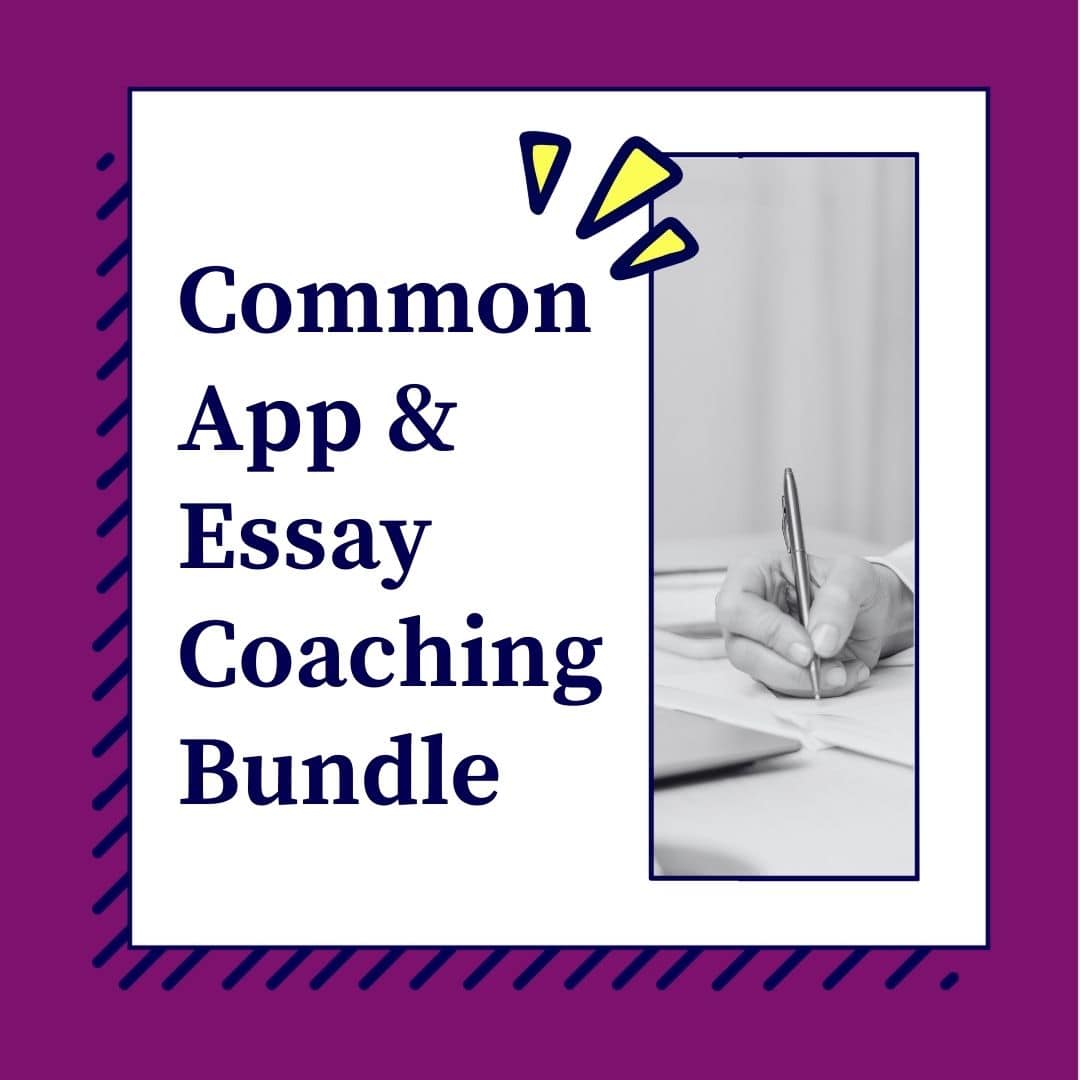
Common App & Essay Coaching Bundle

Essay Writing – Add an Hour
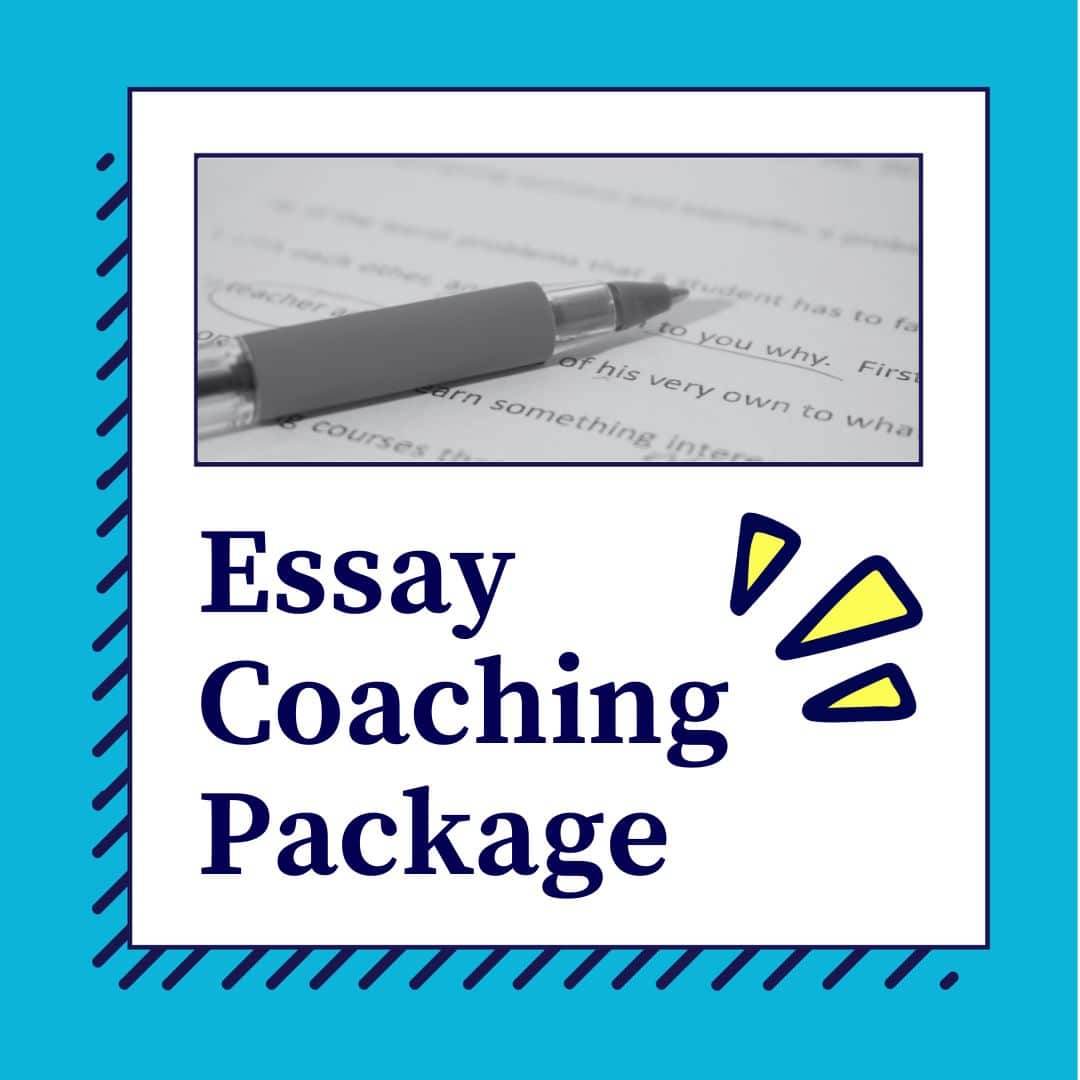
Essay Coaching Package

R2C Insights Academy Live – Paid in Full ($499)
R2c insights academy live – paid in full ($599).
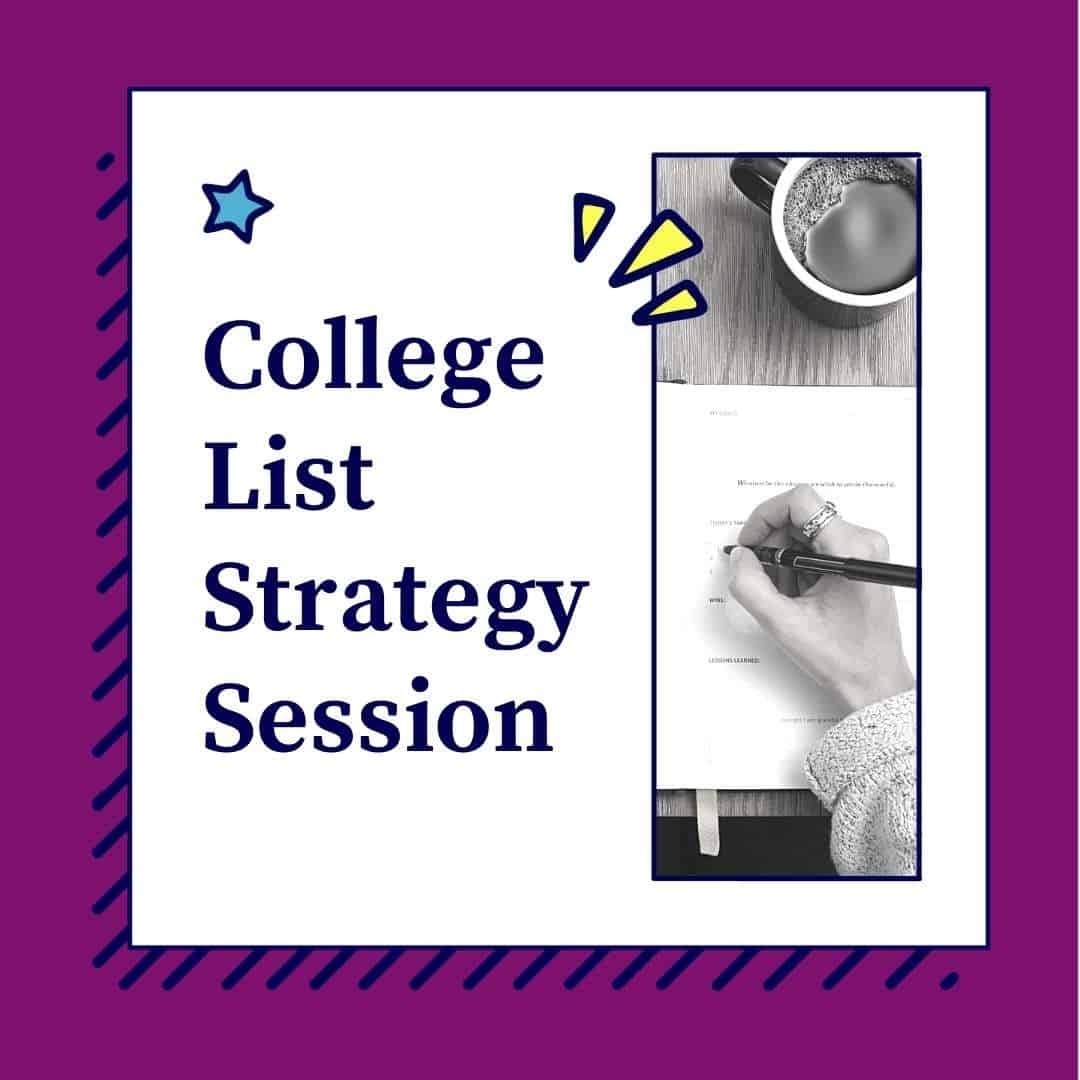
College List Strategy Session
R2c insights academy bundle – paid in full, become a member.
At Road2College you’ll find everything you need to make the admissions and paying for college process less stressful and more transparent.
Explore R2C Insights™ — your source for finding affordable colleges and merit scholarships.
Get coaching on admissions and college financing.
Join Road2College where parents and experts work together to inform and inspire college-bound families.
Our Paying for College 101 Facebook Group Has Over
252.2k members, we’ll keep you in the know, receive our newsletter and stay up-to-date on college admissions and paying for college., get started.
By Stage in the Process:
- Plan Academic & Financial
- Research Colleges
- Apply to College
- Compare College Offers
- Decide Where to Attend
- Pay for College
- Go to College!
Information Hub
- Higher Ed Updates
- College Financial Planning
- College List Building
- Financial Aid
- Financial Aid Appeals
- High School Academics & Activities
- Merit Scholarships
- Paying off Loans
- Standardized Tests
- Student & Parent Loans
Tools & Services
- R2C Insights
- Other Services
- Partnership Opportunities
- Privacy Policies
- Term & Conditions
Ad Policy Disclaimer: Product name, logo, brands, and other trademarks featured or referred to within Road2College are the property of their respective trademark holders. Information obtained via Road2College™ is for educational purposes only. Please consult a licensed financial professional before making any financial decisions. This site may be compensated through third party advertisers. This site is not endorsed or affiliated with the U.S. Department of Education. By visiting Road2College’s site, you accept and agree to be bound by Road2College’s Terms of Use.
Calculate for all schools
Your chance of acceptance, your chancing factors, extracurriculars, what do colleges actually look for in application essays.
So, the main question plaguing me right now is: What are colleges actually trying to find out through our essays? I get that they want to know us better, but are there specific qualities or experiences that they prefer to read about? Or is it all about how well you can write? Just trying to understand the mindset behind the admissions process a little better.
It's wonderful that you're seeking to understand the college admissions process more deeply. Essays are a crucial opportunity for you to showcase your individuality beyond grades and test scores. Admissions officers are looking for authenticity and a clear sense of self. They're interested in how you reflect on your experiences, your values, and how you overcome challenges. It's not merely about showcasing a 'perfect' experience; rather, it's about the learning and growth that result from your experiences. Your ability to communicate effectively and write well is important, but the content is just as critical. They want to see that you're thoughtful and capable of introspection. An essay that might delve into how you’ve pursued a particular passion, for example, could illustrate dedication, creativity, or problem-solving skills. The key is to be genuine and to let your unique voice shine through.
About CollegeVine’s Expert FAQ
CollegeVine’s Q&A seeks to offer informed perspectives on commonly asked admissions questions. Every answer is refined and validated by our team of admissions experts to ensure it resonates with trusted knowledge in the field.
- Campus Life

Hey there, future college student! We know you’re busy worrying about grades and test scores, but have you ever wondered what do colleges look for beyond numbers? It turns out, a lot! 😨
So, don’t just focus on getting straight As . Take a break from studying, learn the secrets to impressing admissions committees , and check out these 11 insider tips that will help you stand out from the crowd.
1. A High GPA and Class Rank
2. ap and honors classes, 3. strong sat/act scores, 4. commitment to extracurricular activities, 5. compelling letters of recommendation , 6. an excellent personal essay, 7. volunteer and work experience, 8. special talents or abilities, 9. passion for personal interests , 10. diversity, 11. a genuine interest in the college’s offering, what’s next when applying to colleges, what do colleges look for 11 ways to stand out to admissions committees: frequently asked questions .
Like it or not, getting into college is mostly a numbers game. In the eyes of the admissions committee, your high school grades predict your future academic performance.
It’s likely that your transcript (a document listing your courses, grades, and honors) will be carefully reviewed . 🧐
Consistently high grades are important because they demonstrate your persistence to excel academically . But don’t panic; selection committees won’t expect perfection.

You may not have straight As , but if you took challenging classes and did well, that may be just as impressive to the admissions officer — a B+ in calculus will say more than an A in Algebra 1. ✅
Plus, college admissions committees want to know how you stack up against your peers, and a high-class rank can help you a great deal in that aspect .
READ MORE: Weighted GPA vs. Unweighted GPA: Which Do Colleges Look At?
While these college-level courses may require extra time and effort, taking Advanced Placement (AP) and honors classes showcases your dedication to tackling advanced subjects with a more rigorous curriculum.
Through AP classes, you can explore complex topics, develop critical thinking skills, and demonstrate academic excellence — which is what colleges look for in applicants. 🧠
The cherry on top is that you can save thousands of dollars in tuition when you earn college credit through AP exams. 🍒
Aside from boosting your GPA, this means that you might be able to skip introductory-level classes in college, thus reducing the number of courses you need to take .
The mere mention of the SAT or ACT makes most high school students groan. But the reality is that your scores on these standardized tests can make a difference when it comes to impressing college admissions committees. 💯
It may not be the most exciting part of the application process, but investing time and effort into mastering these tests can pay off in a big way.
Students who perform well on the SAT or ACT exams have a better chance of getting into college , as well as earning prospective scholarships , early decision admission options, and college course credits. ✅

While several colleges have moved towards test-optional policies in recent years, submitting a strong test score is still on the list of things higher educational institutions look for in applicants and can give you an edge over your peers.
TIP: Over 80 percent of US colleges no longer mandate standardized tests for applicants. While test-optional colleges claim no bias, submitting SAT/ACT scores can boost your application, according to admissions experts.
READ MORE: SAT Dates and Deadlines: Quick Guide and Tips [2023-2024]
From volunteering at animal shelters and starting environmental clubs to showcasing your mad guitar skills in a school band, extracurricular activities can be the golden ticket to your dream college!
By dipping your toes in any of these side gigs, you’re demonstrating how well-rounded, curious, and engaged you are as a learner . 🏀

Admissions officers are interested in the impact of your work and the lessons you’ve learned along the way. So when filling out your application, make sure to highlight how you’ve grown and the challenges you’ve overcome .
READ MORE: How to Get Involved on Campus
When considering what colleges look for in applicants, most students think about a high GPA, test scores, and essays. What many overlook is the significance of strong letters of recommendation . 🤔
A well-written letter from a credible teacher or counselor can highlight your strengths and contributions to your school or community. It can also provide insights into your personality and character that your grades and test scores can’t capture.

Colleges typically require one to three recommendation letters from high school teachers or counselors so choose wisely! 🧑🏫
Pick people who know you well and ensure they can attest to your strengths. Share your achievements, goals, and interests with them to help them write a personalized and compelling letter.
A killer personal essay is your ticket to grabbing college admissions officers’ attention , allowing you to showcase your unique personality and stand out from the crowd. ✍️
What do colleges look for in essays? Select a topic that emphasizes your strengths and reveals your character . They want to see the real you shine through. So, begin with an engaging introduction that grabs the reader’s interest right away.
Connect this experience to your intended field of study or future aspirations. Remember to stay true to your authentic voice to captivate the readers — illustrate how you can make a valuable contribution to your desired college community . ✉️
Volunteer opportunities go beyond impressing colleges — they offer college students skill development and career exploration.
When you detail the responsibilities and accomplishments you’ve handled, these can provide insight into your personal growth, work ethic, and leadership abilities . 🙋

Whether you worked for local mom-and-pop shops, community centers, or big businesses as interns , collect soft skills and practical experience (and a few connections along the way) to set the stage for future success. 🤝
Let your personality shine through and let admissions officers see the awesome person you’ve become through these experiences.
If you excel in music, sports, or writing, highlight your accomplishments when applying to college. Mention any outside achievements, like winning local contests or performing at community events — this can illustrate your commitment and skills beyond academics. 🎶
Take, for instance, James Austin , who earned a full scholarship to the University of Arizona because of his musical talent.

Remember, expressing your genuine enthusiasm for your hobbies and talents can make a strong impression and demonstrate your dedication to personal growth beyond the classroom. 👏
TIP : You’ll stand out even more if you go that extra mile and add a portfolio or a self-tape video that exhibits your abilities when submitting your application.
Passion goes hand in hand with motivation and drive, and it’s exactly what colleges look for besides grades. Students who are passionate about an activity or skill are more likely to go the extra mile , pushing themselves to excel and make a positive impact.
That’s why colleges want students who are excited to be there, so make it clear why you’re drawn to the particular school while applying. ✨

Let’s say you’re an aspiring literature student, talk about how the college’s literature program is top-notch or how a particular professor’s published work impressed you. 📚
You can also prove your interest by scheduling a campus visit early on , actively reaching out to the admissions officers, and applying for early action or early decision enrollment.
READ MORE: How to Apply to College: 9 Steps to Application Success
Having a diverse student body is incredibly important for college authorities because it creates a vibrant and inclusive community where people from different backgrounds, cultures, and perspectives can come together to learn and grow.
Maybe you’re a first-generation college student or an international candidate pursuing higher education in the country? Or perhaps you are not a legal US resident and are considering applying as an undocumented student ?
If you have a unique background or an unconventional story to tell, don’t be afraid to let your diversity shine through in your application . In fact, that’s exactly what colleges look for in high school students.
Who knows? It could be the very thing that catches the eye of admissions officers! 🤩
Want to follow in the footsteps of legendary athletes like Michael Phelps and Serena Williams? Imagine honing your extracurricular skills in the state-of-the-art athletics facilities of your dream college. 🏫
When you’re writing your application, don’t just list generic reasons for why you want to attend that school . It’s essential to understand what do colleges look for in prospective students so you can be specific and talk about what sets that college apart from the rest .

Remember, colleges want students who are genuinely interested in their programs . So, if you want to impress admissions officers, let your commitment shine through in your application.
First, figure out what type of education is the best fit for you . Are you aiming for a trade school , a community college, or a public or private college ? Then determine how many colleges you’re applying to before figuring out a plan on how you’ll pay for college .
Sure, you can apply for federal student aid and scholarships to reduce the cost of attendance. But did you know that affordable four-year universities and free community colleges exist? Some schools even forgo application fees for low-income families. 🆓

Next, take a good look at your college resume and think about areas that could use a little sprucing up. Does it address what colleges look for in applicants?
You might wanna think about boosting your volunteer gig or getting more involved in fun stuff outside class. And hey, don’t sweat it — you can totally start rounding up those recommendation letters and tossing around essay ideas whenever you’re up for it .
Finally, before you start sending out applications left and right, proofread your materials for any typos , grammatical errors, or inconsistencies. It’s crucial to present a polished and professional application to make a strong impression on admissions officers. 🔍
College admissions committees read through thousands of applications. It’s easy to get lost in the shuffle if you don’t showcase what they want to see. 📋
You don’t have to be the next Einstein or Picasso to impress admissions committees. By pairing hard work, determination with these insider tips, you can stand out from the crowd and increase your chances of getting into your dream school . 💡

What do colleges care about most?
Getting good grades consistently is an obvious answer, but your chances will improve if you prove that you can excel in challenging classes.
College admissions officers also evaluate your curriculum, standardized test scores, and personal essay.
What makes you stand out to colleges?
Concentrate on doing well in school and enrolling in challenging classes if you want to stand out in college.
Display a variety of character traits, take part in meaningful activities outside of school, and gain unique work experience.
What classes do colleges look for?
While individual institutions may have varying standards and preferences for high school coursework, generally speaking, they are looking for applicants who have completed an extensive and well-rounded course load .
English, math, science, and social studies are all required subjects. Colleges also check for students who have completed honors, AP, or IB courses since these courses show academic potential and aptitude for college-level work.
What do colleges look for besides grades?
Colleges evaluate extracurricular activities, essays, test scores, and recommendations to ensure candidates have pursued their passions even outside the classroom.
What do colleges look for in essays?
Colleges look for an applicant’s distinct perspective, competitive writing skills, and an authentic voice.
Your unique perspective allows you to stand out from the crowd, show off your ability to articulate your thoughts clearly, concisely, and effectively, and and let your true personality shine through in your writing.
What do colleges look for in recommendation letters?
Colleges look for sincere letters of recommendation that reflect the applicant’s accomplishments and abilities. It’s a chance for them to showcase their character, abilities, and potential for college success.
Other Readers Loved:
The College Post is part of Globe Post Media, a US digital news organization publishing the world’s best targeted news sites.
Latest Posts
11 things that won’t be the same after college graduation, 10 foolproof tips to pass the bar exam, how to choose a career: 10 practical tips you should know, most popular, 31 states with free community college to save you money, 73 top side hustles for college students to make fast cash in 2024, these are the cheapest colleges in the us, fast access, want to stay up to date.
Get the latest news about higher education in the US straight to your inbox.
© Globe Post Media | All rights reserved
What are your chances of acceptance?
Calculate for all schools, your chance of acceptance.
Your chancing factors
Extracurriculars.
What Admissions Officers Look for in Your College Essay?
This article was written based on the information and opinions presented by Anna Smist, a Yale Admissions Officer, i n a CollegeVine livestream. You can watch the full livestream for more info.
What’s Covered:
Writing about specific moments.
- Appealing to Admissions Officers
When it comes time to submit these essays, you will either be applying through QuestBridge , the coalition application , or the common application . Essays are one of the most important portions of a student’s college application. They present an irreplaceable opportunity to paint a picture for the admissions officers of who you are. College essays do pose their unique set of challenges, but there are tricks to help students with this process.
To get started, think about the purpose behind these essays. A student has about 500 words or less to convey their story to admissions officers. When you’re writing, your topic doesn’t have to be about anything specific; it can be more general. Some of the best essays students have submitted were not about detailed descriptions of their interests but an experience.
You can start with a general topic, such as your interests or extracurricular activities, and then dive deeper into a specific experience you had in one of those topics. An example could be writing about a relationship that you have with someone, but, instead of talking about the relationship, you can reflect on a conversation you had with them. This will bring a personal aspect to the essay and make the reader feel more connected to you as the writer. Similar things can be done with places. If you want to write about a place that has meaning to you, you can dive into a particular event that happened at that location and why it has meaning to you. Your essays are all about bringing the reader into your life, and the best way to accomplish that is by writing about specific events.
Appealing To Admissions Officers
Making your story unique.
Students shouldn’t write about anything too general, and there are no cookie-cutter expectations for students’ essay topics. When you approach your essays, try to write about something only you can talk about. There are thousands of students writing about the same topic as you are, so you have to find a way to differentiate yourself from the others. This is what admissions officers are looking for in your essays. They want to read about a unique story or memory that no other student could have written about except for you.
Let Your Voice Shine Through
Ultimately, when it comes from your voice or your view, it’s going to sound unique and different. Think about books and movies. Many are over the same topic, but the way the story is told matters a lot. When you read a novel from the first-person perspective, you get inside that person’s head for a moment and get to see how they think. Reading essays is something admissions officers really like because they get to know the student. When you are writing your essay, make sure your voice comes through . Admissions officers want to know what kind of student you are and how you will fit into their campus community. The best way for them to understand this is through your essays.
Students often share topics or stories that the admissions officers might not be familiar with. For example, when writing about your diverse experience in terms of sexuality, gender, or race, the admissions officer reading it might not be familiar with your exact experience. No matter your topic, make sure you provide some context to your essays so that no matter who the admissions officer is, your story will come across.
If you’re looking for some examples of college essays to help get you started, check out this post: 19 Stellar Common App Essay Examples .
Related CollegeVine Blog Posts

What are colleges looking for in my application essay?
Knowing what to include in a college essay is half the battle. Admissions teams look for many things, but the most influential are authenticity, writing ability, character details, and positive traits. The purpose of the essay is to shed light on your background and gain perspective on your real-world experiences.
Also Found On

Choose Your Test
Sat / act prep online guides and tips, what do colleges look for in admissions why are the sat/act important.
College Admissions

Applying to college soon? Curious about what colleges are looking for in applicants, especially when it comes to SAT or ACT scores? Not sure how you stack up against other applicants at your dream school?
If you feel like you have more questions than answers about what colleges look for in admissions, you're note alone. The college admissions process can be very confusing, and it's easy to feel lost and frustrated. In this article, we'll tell you what colleges look for in admissions and how to make your application the best it can be. We'll cover:
- What colleges look for in applicants
- Why SAT and ACT test scores are important
- How understanding college admissions criteria can help your own college admissions process
Let's dive in!
What Do Colleges Look For in Applicants?
When colleges look at applicants, they're hoping to find students who will succeed in college and beyond. Most universities are looking for students who will excel in their classes, but will also contribute to the on-campus community in their own unique ways.
So how do colleges identify these amazing students? Colleges use your scores (SAT/ACT scores, GPA/transcript, class rank, and other test scores) as well as your extracurriculars, application essays, and letters of recommendation to judge your readiness to attend their school. They want to know that you'll be a good student, but they also want to ensure you'll add to their college community both now and as an alumni.
How Do Colleges Judge Applicants?
Now that we have a basic overview of what colleges look for in applicants, we'll address each part of the application and discuss how the college judges you based on that particular section.
SAT/ACT Scores
The main value of SAT/ACT scores is that they provide colleges with a standard way to judge students. Every applicant will have a varied background: they've attended a different schools and/or and taken different classes. However, nearly every applicant will have taken the SAT or ACT.
Colleges use your SAT/ACT score as an indicator of whether you're ready to attend their school. To show you're academically prepared, you'll need to have a score within the average SAT/ACT score range for admitted students to that school ... or perhaps even higher. To give yourself the best chance of admission, you should aim for a score at or above the 75th percentile SAT/ACT score for admitted students. (We'll talk more about how to find this range a little later.)
It’s important to note that some schools don’t make taking the SAT or ACT an absolute requirement for admission. These schools , for instance, have a “test-optional” admission choice for prospective students. In addition, because of cancelled or rescheduled test dates due to the COVID-19 pandemic, some schools have chosen to go test-optional for 2021 and 2022 ...and some may continue that policy in the future (like the University of California schools ).
GPA/Transcript
Colleges are looking at your GPA and transcript for two major reasons:
- To see what classes you chose to take.
- To see how you did in your classes.
Colleges want to see what classes you took in high school and how you performed in them to ensure you're prepared to attend their college. Based on your GPA/transcript, admissions counselors can gauge whether you're ready to take on the courses offered at their school.
To gauge your own academic preparedness, we recommend you check out the admissions profile for your dream school. See what the average GPA is for admitted students at that college. You can find it by conducting a Google search for "[College Name] + GPA + PrepScholar." That will bring you to our admissions page for that school.
Once you've figured out what the average GPA range is for admitted students, try to get your GPA into a similar range to give yourself the best chance of admission.
For s tudents interested in competitive colleges ( Ivies , Stanford , Vanderbilt , etc.), when admissions officers look at your transcript/GPA, they're hoping to see that you opted to take the most difficult classes at your high school and that you did very well in them.
So if you hope to be accepted to a top tier school, and your school offers IB/AP courses , you should be working those classes into your schedule. Top college admissions officers typically say that they'd rather see that you got a B in an AP or IB course than an A in a regular non-AP/IB course (when IB/AP courses are offered). If there are no IB or AP classes offered at your school, obviously admissions officers don't expect you to have taken any.
All that being said, what can you do to make your GPA/transcript strong? First things first: work hard and keep your GPA up. From there, take the hardest classes that are offered at your school and do well in them. (And of course, all of this requires lots of hard work!)
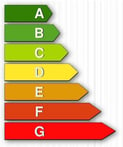
You'll always have a higher grade than G!
Your class rank is tied to your transcript and GPA. The higher your grades are (and likely, the more A P and/or IB classes you take and get As in), the higher your class rank will be. And your class rank will be an important admissions consideration if you plan to apply to super competitive schools.
Top tier colleges ( Harvard , MIT , UPenn ) really only want students who are ranked in the top 10% of their high school class. One student we talked to did a high school summer program at one of the Ivies. The program he took part in was known to accept almost all participants into the college. He was not admitted. When he asked why, he was told that it was a big deal to them that he was not ranked in the top 10% of his class.
Class rank also matters when it comes to admission to state schools, too. In some states, like Texas , students who graduate in the top 5-10% of their class are guaranteed admission in state schools. So if you do well in high school, you'll be guaranteed a spot in an in-state public school once you graduate
If you're hoping to attend a top tier school or plan to take advantage of in-state schools' admissions policies, class rank matters . Try to take the hardest classes and get your grades up to stay near the top of the class. Regardless of your class rank, however, make sure you're keeping your GPA up. You'll want to make sure it's well above average if you want to get into your dream school!

Maybe your hobby is fashion-forward jogging. Whatever your hobby is, your potential colleges want to know about it.
Extracurriculars
So what do colleges look for in admissions when it comes to extracurriculars?
Like we mentioned earlier, colleges are looking for top notch applicants who will add to their campus communities. Extracurriculars are one way colleges can learn more about you and whether you're a good personality fit for their school. All colleges like to see that you got involved in extracurriculars, and they especially like to see that you held a leadership role in them.
Top tier colleges (Harvard, Stanford, Yale) want to see that you have an expertise in some area, and you can build that expertise through your extracurricular activities. It doesn't matter what that area of expertise is, but whatever you choose, explore it deeply. If you like science, try to win the state science fair , compete in science olympiads , and/or intern at a local lab. If you like acting, compete with your debate team in the acting categories (Dramatic Interpretation, Humorous Interpretation, Duo Interpretation), stage a play for free at your local children's hospital, and/or do regional theater.
If you are hoping to attend a top tier school like Harvard—and want to impress them with your extracurriculars—our article How to Get Into Harvard and the Ivy League, by a Harvard Alum discusses this in more depth.
But having great extracurricular activities on your college applications is important for everyone , no matter which colleges you apply to. To learn more about what extracurricular might be good for you, check out this article.
Letters of Recommendation
Letters of recommendation give admissions officers an important glimpse into how others perceive you as a student, community member, and person. Because these letters are anonymous, t hey're often seen as authentic and honest glimpses into who you are and whether you're ready to succeed in college.
NOTE: Some colleges don't require letters of recommendation nor personal essays, so make sure to check the admissions website for your target colleges.
You want to have great letters of recommendation that rave about who you are, what your passion is, and how great you are at what you're passionate about. Check out these examples of great letters of recommendation and the breakdown of what makes them so great .
Personal Essays
Like a letter of recommendation, your personal essays (if required) should reveal who you are and what you want from your education and beyond . These essays give admissions counselors more insight into who you are as a person, and how you'll fit into their unique campus.
These are an important part of your college application, so be sure to start them long before they're due. But don't worry: we have tons of college admissions essay resources to help you out! Check out these example college personal essays along with tips to create a memorable one. And of course, don't miss this blog that goes over everything you need to know about writing a personal essay in the first place.

What about AP/IB tests? How do those scores affect your admissions?
Other Test Scores
Other test scores include AP/IB exam scores, SAT Subject Tests ( these only apply through June 2021—after that they are being discontinued ), and any other non-SAT/ACT exams that you've taken that you're choosing to include on your application. Just like the ACT/SAT, colleges look at these to evaluate your readiness for their college . Additionally, many schools award college credit or placement if you score high enough on AP or IB exams.
Colleges use these other test scores to double-check that you're ready for their school. If you got a perfect SAT score but failed every AP exam that you took, then an admissions officer may question if you're prepared for their coursework. Basically, don't let your other test scores be a red flag. T ake your other test scores seriously but know that they won't hurt your chances unless the scores are really low (failing for AP or IB exams).
That said, don’t stress about one not-so-great AP test —your AP test scores will only hurt you if they are all bad. Just try to get the highest scores you can on your AP and IB exams so that your high scores give colleges another reason to accept you!
Why Is Your SAT/ACT Score so Important?
There are two main reasons that your SAT/ACT scores are important to colleges. Let's discuss each reason one at a time.
Reason #1: Your SAT/ACT Score Is How Colleges Compare You to Other Applicants from Around the World
While applicants to one college will come from different backgrounds, will have attended different high schools, will have taken different classes, and will have done different extracurricular activities, all of the applicants will have taken the SAT and/or ACT (at least at non- test optional schools ).
Your SAT/ACT score reveals whether your GPA and transcript are accurate representations of your preparedness for higher education. Colleges use your SAT/ACT score to figure out if your high school grades were inflated or accurate. For example, if you have a 4.0 GPA with a perfect SAT or ACT score, colleges will likely be impressed and think your GPA is reflective of your academic potential (since your scores were so high). However, if you have a 4.0 GPA with 1000 SAT score or 20 ACT score, colleges may think your course grades were inflated.
Additionally, a high SAT/ACT score can also make up for a lower GPA. If you have a 3.0 GPA with a perfect SAT/ACT score, colleges may be willing to overlook your lower GPA and consider your SAT/ACT score as an indication that you're prepared for college.
As mentioned above, some schools don’t require applicants to have taken either exam. But, even test-optional schools may use SAT and ACT scores to compare applicants. For instance, if you have a 4.0 GPA but no test scores, but another prospective student has a 4.0 GPA and high test scores, this student has provided more proof of their academic potential than you (and may get chosen instead). So, your best bet is to take the SAT or ACT, even if your target school is test-optional.

Colleges use SAT/ACT scores to compare apples to oranges ... or, you know, students to other students!
Reason #2: Colleges Are Judged by Their SAT/ACT Score Ranges
Yes, the SAT/ACT is important to schools because they use it to judge your readiness for college. However, it's also important to schools because if you're admitted, your SAT/ACT score will be incorporated into their yearly SAT/ACT statistics.
Every year, colleges publish their freshman admissions profile (see an example from Princeton). In this profile, colleges provide the data on their admitted students. This data includes either the 25th/75th percentile SAT/ACT scores (sometimes referred to as the middle 50%) or the average SAT/ACT scores of admitted students. The 25th percentile score means that 25% of admitted students scored at or below that score (and therefore 75% of admitted students scored above). The 75th percentile score means that 75% of admitted students scored at or below that score (and therefore 25% of admitted students scored above). The average score is just what it sounds like, an average of all the admitted students scores.
The general public looks at this data to perceive the selectivity of the school (the higher the range, the more competitive or "better" the general public thinks that college is). When you think of top-tier schools such as Dartmouth , Brown , or Columbia , you likely think, "Wow those are good schools!"
But why do you think they are good schools? You might think of their alumni or campuses. However, many lower ranked schools such as Denison have beautiful campuses with famous alumni like billionaire Michael Eisner . You might think of their low admissions rates, but there are other colleges with comparable admissions rates to the Ivies , and their rates don’t necessarily reflect the academic excellence of students they admit.
One of the main reasons you associate top tier colleges with prestige is because of their published SAT/ACT score ranges and their ranking among other colleges. When doing research on applying to schools, you likely came across the US News & World Report ranking of US colleges. Each year, US News & World Report assembles their rankings based on several categories including the SAT/ACT scores of admitted students.
If you're admitted to the school, your SAT/ACT score will be factored into that school's overall national ranking in US News & World Report . Top tier colleges such as Princeton, Yale, and Stanford want your SAT scores to be good so that it reflects well on them. Even "second tier schools" such as Vanderbilt, USC, and Emory care about this because they hope to continue to rise in the US News & World Report rankings.
What Does This Mean for You?
If admissions officers are judging you so heavily by your SAT/ACT score, you want to get a score that will meet their standards. As I mentioned earlier, colleges are hoping to admit students who are in or above their SAT/ACT score range (or at or above the average).
Here at PrepScholar, we recommend that you try to get your score at or above the 75th percentile SAT/ACT score of admitted students to give yourself the best chance of admission. Let's set that as your SAT/ACT score goal.
Setting a Score Goal
To give yourself the best chance of being admitted to your dream school, you need to set a score goal that is at or above the 75th percentile SAT/ACT score for that school.
How do you find out what the 75th percentile SAT/ACT score for that school is? Here at PrepScholar, we've created a very cool resource to locate each college's 25th/75th percentile score and to calculate your chance of admissions to a given school based on your SAT/ACT score and GPA.
To access this resource , simply Google Search, "[College Name] [ACT or SAT score] PrepScholar." For example, I looked for Emory University page:
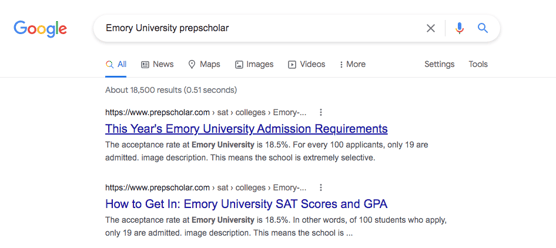
The first two search results are both from PrepScholar. The Admission Requirements page give GPA, SAT, and ACT data. The second page only gives information about the SAT and GPA.
Start by looking at our complete admission requirement articles for your target colleges to get a sense of the SAT and ACT scores of admitted students . Here's a sample of our Emory University admissions guide :
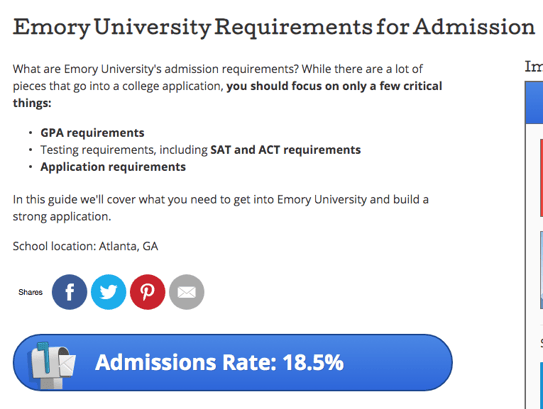
Scroll down, and you'll find the SAT and ACT data:
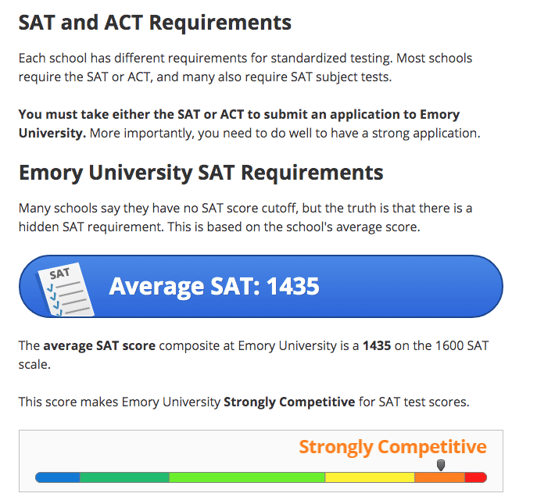
As we mentioned before, aim for a score at or above the 75th percentile score , so for Emory, that would be a 34 or above on the ACT or a 1520 or above on the SAT. Why aim so high? You want to give yourself the absolute best chance of admission. You want to be in the top group of applicants. You want the admissions officer to see your application and say, "duh, they should get in." Okay, they'll likely say something more eloquent, but you get my point.
You might be thinking, " 25% of admits score below the 25th percentile, can't I just score slightly below the 25th percentile and get in?" In theory, yes, you can. In reality, it's unlikely.
Colleges will admit certain applicants with lower SAT/ACT scores because that college needs that student for some reason. For example, colleges sometimes accept athletes , legacies , or students with another exceptional talent (the #1 ranked debater in the US or a world-class violinist) who have lower SAT/ACT scores. Also, colleges sometimes accept students with lower scores who are the children of significant alumni donors or the children of other wealthy or famous people.
Unless you fall into one of the above, try to aim for a score at or above the 75th percentile score. While these students may not make up 25% of the admitted students, it's better to be safe than sorry. Get your score at or above the 75th percentile to give yourself the best chance!
Planning Your Prep
Now that you've set your SAT/ACT score goal, you need to create a plan to reach it. Check out our guide to planning your study based on the amount of improvement that you're hoping for and based on the amount of time you have to study .
Need a launching off point for your test prep? Check out our complete guides to SAT and ACT prep . Taking the test really soon (within a month)? Check out our cramming guides to the SAT and the ACT.

What's Next?
Interested in learning more about the college admissions process? Learn about how to get a college application fee waiver, learn about the best extracurricular activities for your college app, and plan your college application timeline.
Not sure where you'd like to go to college? Figure out how to find your target school.
Still not sure whether the SAT or ACT is right for you? Let's help you pick the right test for you!

As an SAT/ACT tutor, Dora has guided many students to test prep success. She loves watching students succeed and is committed to helping you get there. Dora received a full-tuition merit based scholarship to University of Southern California. She graduated magna cum laude and scored in the 99th percentile on the ACT. She is also passionate about acting, writing, and photography.
Ask a Question Below
Have any questions about this article or other topics? Ask below and we'll reply!
Improve With Our Famous Guides
- For All Students
The 5 Strategies You Must Be Using to Improve 160+ SAT Points
How to Get a Perfect 1600, by a Perfect Scorer
Series: How to Get 800 on Each SAT Section:
Score 800 on SAT Math
Score 800 on SAT Reading
Score 800 on SAT Writing
Series: How to Get to 600 on Each SAT Section:
Score 600 on SAT Math
Score 600 on SAT Reading
Score 600 on SAT Writing
Free Complete Official SAT Practice Tests
What SAT Target Score Should You Be Aiming For?
15 Strategies to Improve Your SAT Essay
The 5 Strategies You Must Be Using to Improve 4+ ACT Points
How to Get a Perfect 36 ACT, by a Perfect Scorer
Series: How to Get 36 on Each ACT Section:
36 on ACT English
36 on ACT Math
36 on ACT Reading
36 on ACT Science
Series: How to Get to 24 on Each ACT Section:
24 on ACT English
24 on ACT Math
24 on ACT Reading
24 on ACT Science
What ACT target score should you be aiming for?
ACT Vocabulary You Must Know
ACT Writing: 15 Tips to Raise Your Essay Score
How to Get Into Harvard and the Ivy League
How to Get a Perfect 4.0 GPA
How to Write an Amazing College Essay
What Exactly Are Colleges Looking For?
Is the ACT easier than the SAT? A Comprehensive Guide
Should you retake your SAT or ACT?
When should you take the SAT or ACT?
Stay Informed
Get the latest articles and test prep tips!
Looking for Graduate School Test Prep?
Check out our top-rated graduate blogs here:
GRE Online Prep Blog
GMAT Online Prep Blog
TOEFL Online Prep Blog
Holly R. "I am absolutely overjoyed and cannot thank you enough for helping me!”

Resources / Getting In
What Do Colleges Look For in Students?

It may seem top secret, but colleges are perfectly willing to reveal their most important admission factors. You just need to know where to look.
Colleges typically consider grades in tough courses most important in admissions. But what else do colleges look for? According to the National Association for College Admission Counseling ( NACAC ) , colleges list the following admission factors as the most important.
What are the Most Important Factors in College Admissions?
Grades in college prep courses.
Most colleges will consider your grade in college prep courses the strongest sign of your ability to do well in college. If you perform well in your AP courses , it suggests that you have the ability to take on the college workload. Even if you struggled early in your high school career, colleges will look favorably upon strong improvement in subsequent years.
Strength of curriculum
Colleges look for students who took the most challenging courses available to them who performed well in each class. Some high schools don’t offer many college prep classes. If that is the case for your high school, admissions officers will take this into account. They may also look favorably upon students who seek challenge outside of school; for example, by taking community college courses or AP courses online.
Admission test scores
Your SAT and/or ACT scores might count highly if the college requires or accepts them. Many colleges are now test optional, test flexible, or test blind . Scores from AP tests and the International Baccalaureate ( IB ) exams may also be important, especially to more selective colleges. To best prepare for your tests take a college test prep course or buy a prep book. This will help you study and determine the best way for you to conquer your test and receive the best score possible.
Grades in all courses
Your overall GPA also serves as an indicator of your academic success in high school. Colleges may look at your transcript to get an idea of how you performed in your classes. A transcript is a list of every class taken throughout high school and the grade received in each class. Some colleges will also look at the types of classes you took in high school and note whether you took honors and AP courses if they were available.
How to Get Into a Good College: The Next Most Important Factors
Extracurricular commitment.
Colleges pay attention to your involvement in extracurricular activities. But what counts most to colleges is how long and how deeply you have been committed to one or two of those interests. This could be sports, clubs, music groups, or various other activities. They take into account the leadership roles you have held, what you accomplished, and how much time you committed to the activity.
Letters of recommendation
Many colleges require recommendation letters from your teachers and high school counselor. Other colleges may require additional letters from individuals who know you well and can provide insight into your academic abilities, character, and personality.
Essay or writing sample
Many colleges will ask you to submit an essay or personal statement and some will require you to answer additional questions with shorter essays. Here is your opportunity to put your personality into your application. A well-written essay can tip a decision in your favor and a poorly written one can do the opposite.
Demonstrated interest
Going on a college visit , talking with admission officers, or doing an enthusiastic interview can call attention to how much you really want to attend. Applying for an early decision may also make a good impression.
Colleges that use this factor want to see how much competition high school students had to face to achieve rank. Fewer and fewer colleges are giving class rank much importance. According to the NACAC , fewer than half of high schools now track class rank.

Personal Qualities
Some colleges look for signs of certain personal traits -- such as curiosity, social consciousness, or persistence -- that they feel help students succeed in college. You might be able to get an idea of which traits your colleges value by reviewing their admissions websites and mission statements, or by asking an admissions counselor or current student what types of students succeed at the school. See 9 Personality and Character Traits Colleges Look for in Applicants .
Do all colleges use the same criteria when admitting students?
Colleges don’t all consider the same factors when deciding whether or not to admit prospective students. Talk to a college counselor to learn about what your school of choice considers before accepting students. This can help you be prepared for college applications and interviews. Listed below are some examples.
- Liberal arts colleges , which encourage students to study broadly, may give factors such as essays and demonstrated interest considerable weight.
- Highly selective colleges attract thousands of outstanding students. These colleges typically look to the "next-most important" factors to make their decisions.
- At very large universities, some admission decisions may be made solely based on GPA and test scores.
Colleges consider many factors when admitting students. Remember that different colleges take different factors into consideration during the admissions process. After learning more about these college admission secrets, do some research about the schools you are applying to and find new ways to stand out!

Related Articles
8 factors to never consider when choosing a college.
Spread the Knowledge. Share:
While you’ll consider many factors when making...
9 Personality and Character Traits Colleges Look for in Applicants

Colleges want to see more than...
We try to make content available to you on CollegeData.com that you may find helpful. The content may include articles, opinions and other information provided by third parties. If we can reasonably fact check articles provided by third parties and information used in those articles, we will. However, opinions of third parties are their own, and no fact checking is possible. The content on CollegeData.com may not apply to you or your situation. We recommend that you refrain from acting or not acting on the basis of any content contained on CollegeData.com without consulting with your parents, high school counselors, admissions representatives or other college counseling professionals. We will not be liable for the content on CollegeData.com or your actions based on any content on CollegeData.com.
Frequently asked questions
What are colleges looking for in the essay.
In your application essay , admissions officers are looking for particular features : they want to see context on your background, positive traits that you could bring to campus, and examples of you demonstrating those qualities.
Frequently asked questions: College admissions essays
When writing your Common App essay , choose a prompt that sparks your interest and that you can connect to a unique personal story.
No matter which prompt you choose, admissions officers are more interested in your ability to demonstrate personal development , insight, or motivation for a certain area of study.
The Common App essay is your primary writing sample within the Common Application, a college application portal accepted by more than 900 schools. All your prospective schools that accept the Common App will read this essay to understand your character, background, and value as a potential student.
Since this essay is read by many colleges, avoid mentioning any college names or programs; instead, save tailored answers for the supplementary school-specific essays within the Common App.
Most importantly, your essay should be about you , not another person or thing. An insightful college admissions essay requires deep self-reflection, authenticity, and a balance between confidence and vulnerability.
Your essay shouldn’t be a résumé of your experiences but instead should tell a story that demonstrates your most important values and qualities.
When revising your college essay , first check for big-picture issues regarding your message and content. Then, check for flow, tone, style , and clarity. Finally, focus on eliminating grammar and punctuation errors .
If your college essay goes over the word count limit , cut any sentences with tangents or irrelevant details. Delete unnecessary words that clutter your essay.
If you’re struggling to reach the word count for your college essay, add vivid personal stories or share your feelings and insight to give your essay more depth and authenticity.
If you’ve got to write your college essay fast , don’t panic. First, set yourself deadlines: you should spend about 10% of your remaining time on brainstorming, 10% on outlining, 40% writing, 30% revising, and 10% taking breaks in between stages.
Second, brainstorm stories and values based on your essay prompt.
Third, outline your essay based on the montage or narrative essay structure .
Fourth, write specific, personal, and unique stories that would be hard for other students to replicate.
Fifth, revise your essay and make sure it’s clearly written.
Last, if possible, get feedback from an essay coach . Scribbr essay editors can help you revise your essay in 12 hours or less.
Avoid swearing in a college essay , since admissions officers’ opinions of profanity will vary. In some cases, it might be okay to use a vulgar word, such as in dialogue or quotes that make an important point in your essay. However, it’s safest to try to make the same point without swearing.
If you have bad grades on your transcript, you may want to use your college admissions essay to explain the challenging circumstances that led to them. Make sure to avoid dwelling on the negative aspects and highlight how you overcame the situation or learned an important lesson.
However, some college applications offer an additional information section where you can explain your bad grades, allowing you to choose another meaningful topic for your college essay.
Here’s a brief list of college essay topics that may be considered cliché:
- Extracurriculars, especially sports
- Role models
- Dealing with a personal tragedy or death in the family
- Struggling with new life situations (immigrant stories, moving homes, parents’ divorce)
- Becoming a better person after community service, traveling, or summer camp
- Overcoming a difficult class
- Using a common object as an extended metaphor
It’s easier to write a standout essay with a unique topic. However, it’s possible to make a common topic compelling with interesting story arcs, uncommon connections, and an advanced writing style.
Yes. The college application essay is less formal than other academic writing —though of course it’s not mandatory to use contractions in your essay.
In a college essay , you can be creative with your language . When writing about the past, you can use the present tense to make the reader feel as if they were there in the moment with you. But make sure to maintain consistency and when in doubt, default to the correct verb tense according to the time you’re writing about.
The college admissions essay gives admissions officers a different perspective on you beyond your academic achievements, test scores, and extracurriculars. It’s your chance to stand out from other applicants with similar academic profiles by telling a unique, personal, and specific story.
Use a standard font such as Times New Roman or Arial to avoid distracting the reader from your college essay’s content.
A college application essay is less formal than most academic writing . Instead of citing sources formally with in-text citations and a reference list, you can cite them informally in your text.
For example, “In her research paper on genetics, Quinn Roberts explores …”
There is no set number of paragraphs in a college admissions essay . College admissions essays can diverge from the traditional five-paragraph essay structure that you learned in English class. Just make sure to stay under the specified word count .
Most topics are acceptable for college essays if you can use them to demonstrate personal growth or a lesson learned. However, there are a few difficult topics for college essays that should be avoided. Avoid topics that are:
- Overly personal (e.g. graphic details of illness or injury, romantic or sexual relationships)
- Not personal enough (e.g. broad solutions to world problems, inspiring people or things)
- Too negative (e.g. an in-depth look at your flaws, put-downs of others, criticizing the need for a college essay)
- Too boring (e.g. a resume of your academic achievements and extracurriculars)
- Inappropriate for a college essay (e.g. illegal activities, offensive humor, false accounts of yourself, bragging about privilege)
To write an effective diversity essay , include vulnerable, authentic stories about your unique identity, background, or perspective. Provide insight into how your lived experience has influenced your outlook, activities, and goals. If relevant, you should also mention how your background has led you to apply for this university and why you’re a good fit.
Many universities believe a student body composed of different perspectives, beliefs, identities, and backgrounds will enhance the campus learning and community experience.
Admissions officers are interested in hearing about how your unique background, identity, beliefs, culture, or characteristics will enrich the campus community, which is why they assign a diversity essay .
In addition to your main college essay , some schools and scholarships may ask for a supplementary essay focused on an aspect of your identity or background. This is sometimes called a diversity essay .
You can use humor in a college essay , but carefully consider its purpose and use it wisely. An effective use of humor involves unexpected, keen observations of the everyday, or speaks to a deeper theme. Humor shouldn’t be the main focus of the essay, but rather a tool to improve your storytelling.
Get a second opinion from a teacher, counselor, or essay coach on whether your essay’s humor is appropriate.
Though admissions officers are interested in hearing your story, they’re also interested in how you tell it. An exceptionally written essay will differentiate you from other applicants, meaning that admissions officers will spend more time reading it.
You can use literary devices to catch your reader’s attention and enrich your storytelling; however, focus on using just a few devices well, rather than trying to use as many as possible.
To decide on a good college essay topic , spend time thoughtfully answering brainstorming questions. If you still have trouble identifying topics, try the following two strategies:
- Identify your qualities → Brainstorm stories that demonstrate these qualities
- Identify memorable stories → Connect your qualities to these stories
You can also ask family, friends, or mentors to help you brainstorm topics, give feedback on your potential essay topics, or recall key stories that showcase your qualities.
Yes—admissions officers don’t expect everyone to have a totally unique college essay topic . But you must differentiate your essay from others by having a surprising story arc, an interesting insight, and/or an advanced writing style .
There are no foolproof college essay topics —whatever your topic, the key is to write about it effectively. However, a good topic
- Is meaningful, specific, and personal to you
- Focuses on you and your experiences
- Reveals something beyond your test scores, grades, and extracurriculars
- Is creative and original
Unlike a five-paragraph essay, your admissions essay should not end by summarizing the points you’ve already made. It’s better to be creative and aim for a strong final impression.
You should also avoid stating the obvious (for example, saying that you hope to be accepted).
There are a few strategies you can use for a memorable ending to your college essay :
- Return to the beginning with a “full circle” structure
- Reveal the main point or insight in your story
- Look to the future
- End on an action
The best technique will depend on your topic choice, essay outline, and writing style. You can write several endings using different techniques to see which works best.
College deadlines vary depending on the schools you’re applying to and your application plan:
- For early action applications and the first round of early decision applications, the deadline is on November 1 or 15. Decisions are released by mid-December.
- For the second round of early decision applications, the deadline is January 1 or 15. Decisions are released in January or February.
- Regular decision deadlines usually fall between late November and mid-March, and decisions are released in March or April.
- Rolling admission deadlines run from July to April, and decisions are released around four to eight weeks after submission.
Depending on your prospective schools’ requirements, you may need to submit scores for the SAT or ACT as part of your college application .
Some schools now no longer require students to submit test scores; however, you should still take the SAT or ACT and aim to get a high score to strengthen your application package.
Aim to take the SAT or ACT in the spring of your junior year to give yourself enough time to retake it in the fall of your senior year if necessary.
Apply early for federal student aid and application fee waivers. You can also look for scholarships from schools, corporations, and charitable foundations.
To maximize your options, you should aim to apply to about eight schools:
- Two reach schools that might be difficult to get into
- Four match schools that you have a good chance of getting into
- Two safety schools that you feel confident you’ll get into
The college admissions essay accounts for roughly 25% of the weight of your application .
At highly selective schools, there are four qualified candidates for every spot. While your academic achievements are important, your college admissions essay can help you stand out from other applicants with similar profiles.
In general, for your college application you will need to submit all of the following:
- Your personal information
- List of extracurriculars and awards
- College application essays
- Transcripts
- Standardized test scores
- Recommendation letters.
Different colleges may have specific requirements, so make sure you check exactly what’s expected in the application guidance.
You should start thinking about your college applications the summer before your junior year to give you sufficient time for college visits, taking standardized tests, applying for financial aid , writing essays, and collecting application material.
Yes, but make sure your essay directly addresses the prompt, respects the word count , and demonstrates the organization’s values.
If you plan ahead, you can save time by writing one scholarship essay for multiple prompts with similar questions. In a scholarship tracker spreadsheet, you can group or color-code overlapping essay prompts; then, write a single essay for multiple scholarships. Sometimes, you can even reuse or adapt your main college essay .
You can start applying for scholarships as early as your junior year. Continue applying throughout your senior year.
Invest time in applying for various scholarships , especially local ones with small dollar amounts, which are likely easier to win and more reflective of your background and interests. It will be easier for you to write an authentic and compelling essay if the scholarship topic is meaningful to you.
You can find scholarships through your school counselor, community network, or an internet search.
A scholarship essay requires you to demonstrate your values and qualities while answering the prompt’s specific question.
After researching the scholarship organization, identify a personal experience that embodies its values and exemplifies how you will be a successful student.
A standout college essay has several key ingredients:
- A unique, personally meaningful topic
- A memorable introduction with vivid imagery or an intriguing hook
- Specific stories and language that show instead of telling
- Vulnerability that’s authentic but not aimed at soliciting sympathy
- Clear writing in an appropriate style and tone
- A conclusion that offers deep insight or a creative ending
While timelines will differ depending on the student, plan on spending at least 1–3 weeks brainstorming and writing the first draft of your college admissions essay , and at least 2–4 weeks revising across multiple drafts. Don’t forget to save enough time for breaks between each writing and editing stage.
You should already begin thinking about your essay the summer before your senior year so that you have plenty of time to try out different topics and get feedback on what works.
Your college essay accounts for about 25% of your application’s weight. It may be the deciding factor in whether you’re accepted, especially for competitive schools where most applicants have exceptional grades, test scores, and extracurricular track records.
In most cases, quoting other people isn’t a good way to start your college essay . Admissions officers want to hear your thoughts about yourself, and quotes often don’t achieve that. Unless a quote truly adds something important to your essay that it otherwise wouldn’t have, you probably shouldn’t include it.
Cliché openers in a college essay introduction are usually general and applicable to many students and situations. Most successful introductions are specific: they only work for the unique essay that follows.
The key to a strong college essay introduction is not to give too much away. Try to start with a surprising statement or image that raises questions and compels the reader to find out more.
The introduction of your college essay is the first thing admissions officers will read and therefore your most important opportunity to stand out. An excellent introduction will keep admissions officers reading, allowing you to tell them what you want them to know.
You can speed up this process by shortening and smoothing your writing with a paraphrasing tool . After that, you can use the summarizer to shorten it even more.
If you’re struggling to reach the word count for your college essay, add vivid personal stories or share your feelings and insight to give your essay more depth and authenticity.
Most college application portals specify a word count range for your essay, and you should stay within 10% of the upper limit to write a developed and thoughtful essay.
You should aim to stay under the specified word count limit to show you can follow directions and write concisely. However, don’t write too little, as it may seem like you are unwilling or unable to write a detailed and insightful narrative about yourself.
If no word count is specified, we advise keeping your essay between 400 and 600 words.
Colleges want to be able to differentiate students who seem similar on paper. In the college application essay , they’re looking for a way to understand each applicant’s unique personality and experiences.
You don’t need a title for your college admissions essay , but you can include one if you think it adds something important.
Your college essay’s format should be as simple as possible:
- Use a standard, readable font
- Use 1.5 or double spacing
- If attaching a file, save it as a PDF
- Stick to the word count
- Avoid unusual formatting and unnecessary decorative touches
There are no set rules for how to structure a college application essay , but these are two common structures that work:
- A montage structure, a series of vignettes with a common theme.
- A narrative structure, a single story that shows your personal growth or how you overcame a challenge.
Avoid the five-paragraph essay structure that you learned in high school.
Campus visits are always helpful, but if you can’t make it in person, the college website will have plenty of information for you to explore. You should look through the course catalog and even reach out to current faculty with any questions about the school.
Colleges set a “Why this college?” essay because they want to see that you’ve done your research. You must prove that you know what makes the school unique and can connect that to your own personal goals and academic interests.
Depending on your writing, you may go through several rounds of revision . Make sure to put aside your essay for a little while after each editing stage to return with a fresh perspective.
Teachers and guidance counselors can help you check your language, tone, and content . Ask for their help at least one to two months before the submission deadline, as many other students will also want their help.
Friends and family are a good resource to check for authenticity. It’s best to seek help from family members with a strong writing or English educational background, or from older siblings and cousins who have been through the college admissions process.
If possible, get help from an essay coach or editor ; they’ll have specialized knowledge of college admissions essays and be able to give objective expert feedback.
When revising your college essay , first check for big-picture issues regarding message, flow, tone, style , and clarity. Then, focus on eliminating grammar and punctuation errors.
Include specific, personal details and use your authentic voice to shed a new perspective on a common human experience.
Through specific stories, you can weave your achievements and qualities into your essay so that it doesn’t seem like you’re bragging from a resume.
When writing about yourself , including difficult experiences or failures can be a great way to show vulnerability and authenticity, but be careful not to overshare, and focus on showing how you matured from the experience.
First, spend time reflecting on your core values and character . You can start with these questions:
- What are three words your friends or family would use to describe you, and why would they choose them?
- Whom do you admire most and why?
- What are you most proud of? Ashamed of?
However, you should do a comprehensive brainstorming session to fully understand your values. Also consider how your values and goals match your prospective university’s program and culture. Then, brainstorm stories that illustrate the fit between the two.
In a college application essay , you can occasionally bend grammatical rules if doing so adds value to the storytelling process and the essay maintains clarity.
However, use standard language rules if your stylistic choices would otherwise distract the reader from your overall narrative or could be easily interpreted as unintentional errors.
Write concisely and use the active voice to maintain a quick pace throughout your essay and make sure it’s the right length . Avoid adding definitions unless they provide necessary explanation.
Use first-person “I” statements to speak from your perspective . Use appropriate word choices that show off your vocabulary but don’t sound like you used a thesaurus. Avoid using idioms or cliché expressions by rewriting them in a creative, original way.
If you’re an international student applying to a US college and you’re comfortable using American idioms or cultural references , you can. But instead of potentially using them incorrectly, don’t be afraid to write in detail about yourself within your own culture.
Provide context for any words, customs, or places that an American admissions officer might be unfamiliar with.
College application essays are less formal than other kinds of academic writing . Use a conversational yet respectful tone , as if speaking with a teacher or mentor. Be vulnerable about your feelings, thoughts, and experiences to connect with the reader.
Aim to write in your authentic voice , with a style that sounds natural and genuine. You can be creative with your word choice, but don’t use elaborate vocabulary to impress admissions officers.
Admissions officers use college admissions essays to evaluate your character, writing skills , and ability to self-reflect . The essay is your chance to show what you will add to the academic community.
The college essay may be the deciding factor in your application , especially for competitive schools where most applicants have exceptional grades, test scores, and extracurriculars.
Some colleges also require supplemental essays about specific topics, such as why you chose that specific college . Scholarship essays are often required to obtain financial aid .
Ask our team
Want to contact us directly? No problem. We are always here for you.
- Email [email protected]
- Start live chat
- Call +1 (510) 822-8066
- WhatsApp +31 20 261 6040

Our team helps students graduate by offering:
- A world-class citation generator
- Plagiarism Checker software powered by Turnitin
- Innovative Citation Checker software
- Professional proofreading services
- Over 300 helpful articles about academic writing, citing sources, plagiarism, and more
Scribbr specializes in editing study-related documents . We proofread:
- PhD dissertations
- Research proposals
- Personal statements
- Admission essays
- Motivation letters
- Reflection papers
- Journal articles
- Capstone projects
Scribbr’s Plagiarism Checker is powered by elements of Turnitin’s Similarity Checker , namely the plagiarism detection software and the Internet Archive and Premium Scholarly Publications content databases .
The add-on AI detector is powered by Scribbr’s proprietary software.
The Scribbr Citation Generator is developed using the open-source Citation Style Language (CSL) project and Frank Bennett’s citeproc-js . It’s the same technology used by dozens of other popular citation tools, including Mendeley and Zotero.
You can find all the citation styles and locales used in the Scribbr Citation Generator in our publicly accessible repository on Github .
The Admissions Criteria That Top Schools Really Care About
- Share to Facebook
- Share to Twitter
- Share to Linkedin
Harvard College Admissions
When navigating the competitive college admissions process at Ivy League and other top schools, it’s easy to get lost in a sea of advice, myths, and speculation. Parents, school counselors, and successful applicants are often eager to share their opinions about what truly matters to admissions officers, and weeding through this plethora of information can quickly become overwhelming. While prospective students cannot know for certain what admissions committees’ deliberations look like, there are ways to gain insight into what schools value most in their admissions considerations. For instance, the lawsuit against Harvard revealed that admissions officers rate students on a scale of 1–6 (with 1 being the most desirable score) on the basis of their academic, extracurricular, athletic, and personal skill sets. While the lawsuit offered unique insight into Harvard’s admissions process that isn’t readily available for all other institutions, there are still ways to determine institutions’ primary considerations—the most accessible being the Common Data Sets (CDS).
The CDS is a detailed report compiled by colleges and universities to share their institutional data, including admission statistics and criteria. Each school’s report includes a lengthy list of admissions considerations from class rank to interviews, talent, legacy status, state residency, essays, and extracurriculars. Colleges indicate the level of importance that each item bears in their admissions process (ranging from “very important,” to “important,” “considered,” and “not considered”). While the information is not comprehensive—for instance, understanding that a school values extracurricular activities does not tell us what kind of involvement the school looks for—it can be a helpful starting point for students as they strategize for the admissions process.
Here’s what the most recent CDS tells us about the admissions criteria top colleges care the most about:
Rigor of Secondary Record
Very Important At Schools Such As : Berkeley , Johns Hopkins , Tulane , UCLA
While many students focus their energy on upping their GPA, it is critical to note that top schools care just as much about the caliber of classes students enroll in. Having a 4.0 means nothing if a student is simply acing the easiest classes available to them. Almost every Ivy League and top school lists the rigor of a student’s academic record as “very important” in their CDS report. As such, students should start enrolling in the most challenging courses available at their school early in their high school careers—whether APs, IBs, or Honors classes. This is particularly important for coursework related to a student’s intended area of study.
Best High-Yield Savings Accounts Of 2024
Best 5% interest savings accounts of 2024.
Application Essay
Very Important At Schools Such As : Stanford , Princeton , Brown
The application essay is an important element of a student’s application because it showcases multiple facets of their candidacy—not only can it demonstrate their academic skills through their strong command of language, but it is also an opportunity for students to share the intangible elements of their candidacy such as their talents, personal qualities, and character (all factors that are listed as “very important” alongside the application essay at all of the schools listed above). Students should strive to compose essays that stand out through their creativity and originality, and that authentically represent their distinct voices.
Extracurricular Activities
Very Important At Schools Such As : Dartmouth , Vanderbilt , Yale
For many Ivy League and top schools, what students accomplish outside of the classroom is equally important as what they accomplish in it. Though not explicitly stated in their Common Data Sets, we know from experience that top schools look for students who demonstrate significant involvement in a few key activities rather than superficial participation in many. This depth of commitment indicates that students can balance multiple responsibilities and contribute meaningfully to campus life. Therefore, students should start to hone their passions and identify opportunities for leadership in activities that they are passionate about early in their high school careers.
Character / Personal Qualities
Very Important At Schools Such As : NYU , Notre Dame , Carnegie Mellon
As a part of the holistic application review process, schools evaluate more than students’ on-paper accomplishments—they also care about how a student’s values, personality, and defining characteristics make them a unique fit for their campus community. What intangible qualities are colleges looking for? This largely depends on the school to which students are applying, but the best way to determine which characteristics to highlight is to read about the college’s mission and values and determine where their own personal qualities align. For example, Carnegie Mellon looks for students who demonstrate “leadership, motivation, passion and perseverance, concern and advocacy for others.”
Recommendations
Very Important At Schools Such As : Northeastern , Emory , Amherst
Letters of recommendation offer qualitative information about students’ academic skills and character, whereas numerical values such as GPA, test scores, and class rank provide quantitative information. They are particularly important because they are the only element of a student’s application that offers a third-party evaluation of students’ skill sets. As such, students should approach these letters with as much strategy and thoughtfulness as other elements of their applications. Every student should select teachers who have thorough knowledge of their academic skills (ideally in the discipline they intend to pursue) and who they have established relationships with over the course of their high school career. Students can also use these recommendations strategically to fill in gaps in their other materials—for instance, if a student struggled academically their junior year, a teacher can attest to their growth and progress over time; or, if a student had a challenging family circumstance, a school counselor can share how they overcame personal difficulties and flourished as a community member and scholar.
Every college has its own unique campus character and institutional values, and thus places emphasis on different elements of students’ applications. Understanding which criteria are particularly important to the schools to which they are applying will help students prepare thoughtfully and strategically throughout their high school careers, ensuring that they enter the application season with confidence and preparation.

- Editorial Standards
- Reprints & Permissions

IMAGES
VIDEO
COMMENTS
What Do Colleges Look For in an Essay? | Examples & Tips. Published on September 27, 2021 by Meredith Testa.Revised on May 31, 2023. As part of the college application process, colleges ask prospective students for a personal essay in order to learn more about them.They want to see context on each student's background, positive traits that the student could bring to campus, and examples of ...
What do college admissions look for in an essay? Reveal your passions, talents, and character with a well-written essay. Ideally, your college essay will illustrate a project or situation that contributed to your personal growth. Many applicants find that taking the time to write a thoughtful essay also helps them figure out what to look for in ...
Strong test scores (relative to what admitted students have) A specific, honest, and well-written personal statement and/or essays. A unique extracurricular interest or passion (a "spike," as we like to call it) Volunteering experience with measurable impact. Compelling letters of recommendation written on your behalf.
Top. Colleges look for three things in your admission essay: a unique perspective, strong writing, and an authentic voice. People in admissions often say that a great essay is one where it feels like the student is right there in the room, talking authentically to the admissions committee! Admission essays are very different from the 5 ...
Therefore, the core aspects that admissions officials at any institution look for in an essay are: · Intelligence. · Strong communication skills. · Ambition and goals. · Creativity. · Proactivity and self-direction. · Interest in education and self-betterment. These elements are not based on any abstract moral consideration-colleges ...
Sample College Essay 2 with Feedback. This content is licensed by Khan Academy and is available for free at www.khanacademy.org. College essays are an important part of your college application and give you the chance to show colleges and universities your personality. This guide will give you tips on how to write an effective college essay.
What do colleges look for in an essay? Admissions officers want to understand your background, personality, and values to get a fuller picture of you beyond your test scores and grades. Here's what colleges look for in an essay: Demonstrated values and qualities; Vulnerability and authenticity; Self-reflection and insight
1. Start Early. Start working on your college application essay early. That way, you'll have time to write and revise your essay well before the application deadline. "I recommend students set aside some time in the summer between junior and senior year to work on their essay," Sonnenberg said.
There are no set rules for how to structure a college application essay, but you should carefully plan and outline to make sure your essay flows smoothly and logically. Typical structural choices include. a series of vignettes with a common theme. a single story that demonstrates your positive qualities. Although many structures can work, there ...
Essentially, show them that you're ready to do college-level writing. 3. Verbs. This is a more focused point than a lot of the others I'm discussing, but one of the simplest, most useful lessons I ever learned about writing in English is that as go your verbs, so goes the rest of your writing.
Writing your essays might seem like the hardest part of applying to college, but remember that this is your real chance to showcase your personality, goals, and achievements to colleges. All you need to do is be honest and true to yourself. Admissions officers want to know what makes you unique. Here are a few tips to keep in mind when crafting ...
Technique #1: humor. Notice Renner's gentle and relaxed humor that lightly mocks their younger self's grand ambitions (this is different from the more sarcastic kind of humor used by Stephen in the first essay—you could never mistake one writer for the other). My first dream job was to be a pickle truck driver.
The opening of your essay should capture the reader's attention and make them want to read more. Use a hook, such as a vivid scene, realization, or statement that relates to your thesis and sets the tone for your essay. 5. Stick to Your Thesis. Every paragraph and thought should relate to and support your thesis.
Admissions officers are looking for authenticity and a clear sense of self. They're interested in how you reflect on your experiences, your values, and how you overcome challenges. It's not merely about showcasing a 'perfect' experience; rather, it's about the learning and growth that result from your experiences.
Share your achievements, goals, and interests with them to help them write a personalized and compelling letter. 6. An Excellent Personal Essay. A killer personal essay is your ticket to grabbing college admissions officers' attention, allowing you to showcase your unique personality and stand out from the crowd.
Reading essays is something admissions officers really like because they get to know the student. When you are writing your essay, make sure your voice comes through. Admissions officers want to know what kind of student you are and how you will fit into their campus community. The best way for them to understand this is through your essays.
Knowing what to include in a college essay is half the battle. Admissions teams look for many things, but the most influential are authenticity, writing ability, character details, and positive traits. The purpose of the essay is to shed light on your background and gain perspective on your real-world experiences.
Reason #2: Colleges Are Judged by Their SAT/ACT Score Ranges. Yes, the SAT/ACT is important to schools because they use it to judge your readiness for college. However, it's also important to schools because if you're admitted, your SAT/ACT score will be incorporated into their yearly SAT/ACT statistics.
Getty Images. Students can go online to review essay requirements for the colleges they want to apply to, such as word limits and essay topics. Many students may start with the Common App, an ...
Other colleges may require additional letters from individuals who know you well and can provide insight into your academic abilities, character, and personality. Essay or writing sample. Many colleges will ask you to submit an essay or personal statement and some will require you to answer additional questions with shorter essays.
What Do Colleges Look for in Application Essays? Colleges use a few different parameters to filter out candidates from among the thousands of applications they receive. Most of us believe that the most important factor is school grades or admission test scores. The truth is that even if other parameters are average, your application essay can ...
Too negative (e.g. an in-depth look at your flaws, put-downs of others, criticizing the need for a college essay) Too boring (e.g. a resume of your academic achievements and extracurriculars) Inappropriate for a college essay (e.g. illegal activities, offensive humor, false accounts of yourself, bragging about privilege)
Again, we'd recommend sticking with standard fonts and sizes—Times New Roman, 12-point is a standard workhorse. You can probably go with 1.5 or double spacing. Standard margins. Basically, show them you're ready to write in college by using the formatting you'll normally use in college.
Tips for writing your college essay. Your college essay format and writing should be both compelling in clear. So, as you're writing your college essay, keep these tips in mind: 1. Be authentic. One of the most essential parts of how to format a college application essay is to be authentic.
Each school's report includes a lengthy list of admissions considerations from class rank to interviews, talent, legacy status, state residency, essays, and extracurriculars. Colleges indicate ...